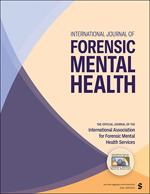
International Journal of Forensic Mental Health
The International Journal of Forensic Mental Health (IJFMH) provides an international forum for disseminating research and practical developments in forensic mental health. Building on its long-standing commitment to applied and interdisciplinary scholarship, the journal publishes research focused on the assessment, treatment, recovery, and rehabilitation of adults and youth with mental health concerns who are involved with the criminal justice or forensic systems.
IJFMH emphasizes applied, empirical, and theoretical contributions that advance understanding and practice across psychology, psychiatry, law, and the social and health sciences. Topics include, but are not limited to, criminal responsibility, competency or fitness to stand trial, risk assessment and management, family and intimate partner violence, and the treatment and rehabilitation of individuals who have offended or are at risk of offending.
The journal is the official publication of the International Association of Forensic Mental Health Services (IAFMHS) and reflects the diverse international community of forensic mental health professionals, researchers, and policymakers. Articles that examine cross-national perspectives, culturally responsive practices, or systemic and identity-based influences on forensic mental health services are particularly encouraged.
The International Journal of Forensic Mental Health aims to advance knowledge, policy, and practice in forensic mental health through rigorous, transparent, and inclusive research. The journal publishes quantitative, qualitative, and mixed-methods studies, program evaluations, policy analyses, and theoretical or integrative reviews that address the intersection of mental health, law, and justice systems.
IJFMH particularly welcomes manuscripts that:
? Examine how identity, culture, and systemic factors shape forensic assessment, treatment, or rehabilitation;
? Evaluate or inform programs and policies that promote culturally safe, trauma-informed, and recovery-oriented practice;
? Address equity, diversity, inclusion, and systemic bias in forensic mental health research or services;
? Apply open science and transparent reporting practices; and
? Incorporate lived experience or community partnership perspectives.
The journal reflects the international membership of the International Association of Forensic Mental Health Services (IAFMHS) and invites contributions from all world regions. Comparative, interdisciplinary, and cross-cultural studies are especially welcome.
IJFMH seeks to support evidence-informed policy and service delivery that enhance both individual recovery and public safety within forensic mental health systems.
| Alicia Nijdam-Jones | University of Manitoba, Canada |
| Carlo Garofalo | Università degli studi di Perugia, Italy |
| Brianne Layden | Simon Fraser University, Canada |
| Brian McKenna | Auckland University of Technology, and Auckland Regional Forensic Psychiatry Services, Auckland, New Zealand |
| Stuart Thomas | RMIT University in Melbourne, Australia |
| Jack Tomlin | University of Greenwich, UK |
| Georgia Winters | Fairleigh Dickinson University, USA |
| Katérine Aminot | University of Manitoba, Canada |
| Apryl A. Alexander | UNC Charlotte and UNC Charlotte Violence Prevention Center, USA |
| Evan Auguste | University of Massachusetts, USA |
| Adam Coffey | Private Practice, Salem, OR, USA |
| Jennifer Cox | The University of Alabama, USA |
| Michael Daffern | Swinburne University of Technology, and Victorian Institute of Forensic Mental Health (Forensicare), Australia |
| Vivienne de Vogel | Utrecht University of Applied Science, Netherlands |
| Eric Elbogen | Duke University, USA |
| John Fabian | University of Texas Health Sciences Center at Houston, McGovern Medical School, USA |
| Emily Glorney | Royal Holloway University of London, England |
| Kris Goethals | Antwerp University Hospital, Belgium, and Mental Health Care WNB, Netherlands |
| Julie Goldenson | University of Toronto, Canada |
| Ilvy Goossens | St. Joseph's Healthcare, Hamilton, Ontario, Canada |
| Emily Gottfried | Medical University of South Carolina, USA |
| Lindsay Healey | University of California Irvine, USA |
| Kirk Heilbrun | Drexel University, USA |
| Evan Holloway | University of California, San Francisco, USA |
| Christopher M. King | Montclair State University, USA |
| Tella Lantta | Manchester Metropolitan University, UK, and University of Turku, Finland |
| Tess Maguire | Swinburne University of Technology, Australia |
| Hjalmar van Marle | Erasmus University Rotterdam, Netherlands |
| Kaitlyn McLachlan | University of Guelph, Canada |
| Abby L. Mulay | Medical University of South Carolina, USA |
| Ade Ogunwale | Neuropsychiatric Hospital, Aro, Nigeria |
| Stephanie Penney | University of Toronto, Canada |
| Emile Picard | Raleigh, North Carolina, USA |
| Barry Rosenfeld | Fordham University, USA |
| Laurance Roy | McGill University, Canada |
| Michael Seto | The Royal's Institute of Mental Health Research, Canada |
| Matina Shafti | University of Greenwich, UK |
| Alexander (Sandy) Simpson | University of Toronto, Canada |
| Ben Spivak | Swinburne University of Technology, Australia |
| Danny Sullivan | Victorian Institute of Forensic Mental Health, Australia |
| Patricia Zapf | Palo Alto University, USA |
| Stephen D. Hart | Simon Fraser University, Canada |
| Ronald Roesch | Simon Fraser University, Canada |